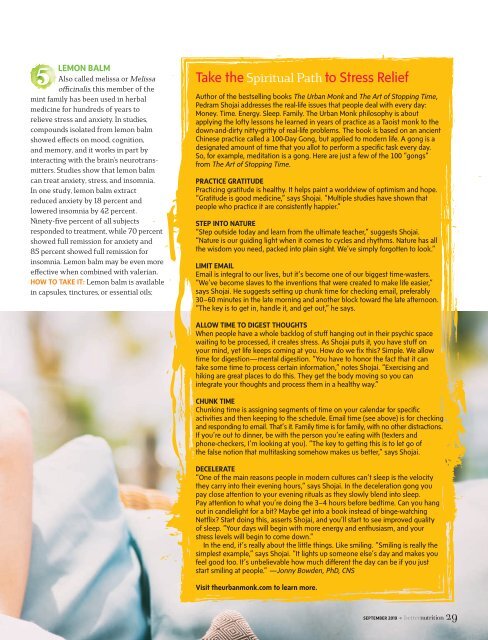Better Nutrition September 2019
You also want an ePaper? Increase the reach of your titles
YUMPU automatically turns print PDFs into web optimized ePapers that Google loves.
LEMON BALM<br />
Also called melissa or Melissa<br />
officinalis, this member of the<br />
mint family has been used in herbal<br />
medicine for hundreds of years to<br />
relieve stress and anxiety. In studies,<br />
compounds isolated from lemon balm<br />
showed effects on mood, cognition,<br />
and memory, and it works in part by<br />
interacting with the brain’s neurotransmitters.<br />
Studies show that lemon balm<br />
can treat anxiety, stress, and insomnia.<br />
In one study, lemon balm extract<br />
reduced anxiety by 18 percent and<br />
lowered insomnia by 42 percent.<br />
Ninety-five percent of all subjects<br />
responded to treatment, while 70 percent<br />
showed full remission for anxiety and<br />
85 percent showed full remission for<br />
insomnia. Lemon balm may be even more<br />
effective when combined with valerian.<br />
HOW TO TAKE IT: Lemon balm is available<br />
in capsules, tinctures, or essential oils;<br />
Take the Spiritual Path to Stress Relief<br />
Author of the bestselling books The Urban Monk and The Art of Stopping Time,<br />
Pedram Shojai addresses the real-life issues that people deal with every day:<br />
Money. Time. Energy. Sleep. Family. The Urban Monk philosophy is about<br />
applying the lofty lessons he learned in years of practice as a Taoist monk to the<br />
down-and-dirty nitty-gritty of real-life problems. The book is based on an ancient<br />
Chinese practice called a 100-Day Gong, but applied to modern life. A gong is a<br />
designated amount of time that you allot to perform a specific task every day.<br />
So, for example, meditation is a gong. Here are just a few of the 100 “gongs”<br />
from The Art of Stopping Time.<br />
PRACTICE GRATITUDE<br />
Practicing gratitude is healthy. It helps paint a worldview of optimism and hope.<br />
“Gratitude is good medicine,” says Shojai. “Multiple studies have shown that<br />
people who practice it are consistently happier.”<br />
STEP INTO NATURE<br />
“Step outside today and learn from the ultimate teacher,” suggests Shojai.<br />
“Nature is our guiding light when it comes to cycles and rhythms. Nature has all<br />
the wisdom you need, packed into plain sight. We’ve simply forgotten to look.”<br />
LIMIT EMAIL<br />
Email is integral to our lives, but it’s become one of our biggest time-wasters.<br />
“We’ve become slaves to the inventions that were created to make life easier,”<br />
says Shojai. He suggests setting up chunk time for checking email, preferably<br />
30–60 minutes in the late morning and another block toward the late afternoon.<br />
“The key is to get in, handle it, and get out,” he says.<br />
ALLOW TIME TO DIGEST THOUGHTS<br />
When people have a whole backlog of stuff hanging out in their psychic space<br />
waiting to be processed, it creates stress. As Shojai puts it, you have stuff on<br />
your mind, yet life keeps coming at you. How do we fix this? Simple. We allow<br />
time for digestion—mental digestion. “You have to honor the fact that it can<br />
take some time to process certain information,” notes Shojai. “Exercising and<br />
hiking are great places to do this. They get the body moving so you can<br />
integrate your thoughts and process them in a healthy way.”<br />
CHUNK TIME<br />
Chunking time is assigning segments of time on your calendar for specific<br />
activities and then keeping to the schedule. Email time (see above) is for checking<br />
and responding to email. That’s it. Family time is for family, with no other distractions.<br />
If you’re out to dinner, be with the person you’re eating with (texters and<br />
phone-checkers, I’m looking at you). “The key to getting this is to let go of<br />
the false notion that multitasking somehow makes us better,” says Shojai.<br />
DECELERATE<br />
“One of the main reasons people in modern cultures can’t sleep is the velocity<br />
they carry into their evening hours,” says Shojai. In the deceleration gong you<br />
pay close attention to your evening rituals as they slowly blend into sleep.<br />
Pay attention to what you’re doing the 3–4 hours before bedtime. Can you hang<br />
out in candlelight for a bit? Maybe get into a book instead of binge-watching<br />
Netflix? Start doing this, asserts Shojai, and you’ll start to see improved quality<br />
of sleep. “Your days will begin with more energy and enthusiasm, and your<br />
stress levels will begin to come down.”<br />
In the end, it’s really about the little things. Like smiling. “Smiling is really the<br />
simplest example,” says Shojai. “It lights up someone else’s day and makes you<br />
feel good too. It’s unbelievable how much different the day can be if you just<br />
start smiling at people.” —Jonny Bowden, PhD, CNS<br />
Visit theurbanmonk.com to learn more.<br />
SEPTEMBER <strong>2019</strong> • 29

















